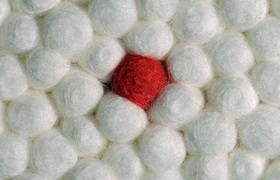 Image: Ross Elliott
Image: Ross Elliott Rare is the under age, or of age teenager/adult who discusses their sexual health or activity with a parent. This is probably wise. If we left it entirely up to the parents we may risk abstinence only education for all teens. Were I a parent I fear that, for all my championing of comprehensive sex education, I'd plump for this one when it came to my spawn, alongside gruesome images of sexually transmitted infections and tales of mysteriously absent friends and their woes that resulted from promiscuity. Forget stay in school, stay at home! However the more familiar a child or teen can be with the ins and outs of sexual health the healthier they will be as adults, which is why I'd let my little sheltered hypothetical kids take this new PSHE class.
Brighton and Hove secondary school Blatchington Mill have added a practical to their PSHE lessons. Now they do not just discuss various sexual infections, they learn how these infections are tested for. The school offers students aged 15 and 16 the chance to administer a chlamydia test as part of their sex education.
The test for chlamydia for women involves inserting a swab into the vagina. For men it's a urine test or the tip of the urethra can be swabbed. During a routine STI test the doctor or nurse will usually invite you to swab yourself in private. It's probably one of the few medical tests requiring the words 'swab', 'insert' and 'genitals' that is truly No Big Deal. Depending on your results of course.
A mother of a daughter in year 11 who attends the school told The Argus newspaper: "She refused to do it because she felt uncomfortable with it. I didn't know anything about it beforehand and I think the school should have let us know as parents that our children were going to be asked to do this.
The test for chlamydia for women involves inserting a swab into the vagina. For men it's a urine test or the tip of the urethra can be swabbed. During a routine STI test the doctor or nurse will usually invite you to swab yourself in private. It's probably one of the few medical tests requiring the words 'swab', 'insert' and 'genitals' that is truly No Big Deal. Depending on your results of course.
A mother of a daughter in year 11 who attends the school told The Argus newspaper: "She refused to do it because she felt uncomfortable with it. I didn't know anything about it beforehand and I think the school should have let us know as parents that our children were going to be asked to do this.
| "I know the tests were done by the students in the toilets, but I think it's humiliating to ask teenagers in class to do a test for an STI." Should the school have taken the time to inform parents that this would be part of the sex education curriculum? Maybe. But the reaction of some parents shows how vital it is that young adults receive education that demystifies and de-stigmatizes sexual health clinics. | the reaction of some parents shows how vital it is that young adults receive education that demystifies and de-stigmatizes sexual health clinics. |
It's also important that young people's confidence is respected. As Jules Hillier of Brook noted when discussing the design of the scheme: "If this scheme was created in consultation with young people, and their dignity and right to confidential services were respected, it may well help to remove some of the anxiety about testing that exists."
The tests are part of an NHS strategy that other schools in the Brighton and Hove area are participating in. Blatchington Mill released a statement saying: "Research shows that this type of provision does not encourage sexual activity.
"The purpose of this programme is to support young people to start making healthy choices around their health, understand what to expect from screening and help them to engage with local health services, in a supportive environment."
Squeamish Kate
The tests are part of an NHS strategy that other schools in the Brighton and Hove area are participating in. Blatchington Mill released a statement saying: "Research shows that this type of provision does not encourage sexual activity.
"The purpose of this programme is to support young people to start making healthy choices around their health, understand what to expect from screening and help them to engage with local health services, in a supportive environment."
Squeamish Kate


 RSS Feed
RSS Feed
